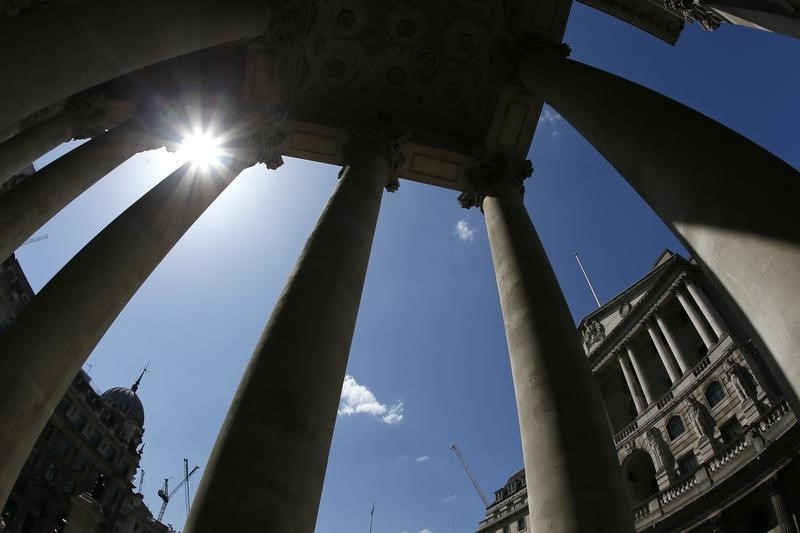By Jonathan Cable
LONDON (Reuters) - The Bank of England will raise interest rates early next year, likely following close on the heels of the Federal Reserve, according to a Reuters poll which concluded it should not be swayed by easing elsewhere in Europe.
Around 40 central banks have loosened policy this year - including the European Central Bank - but roughly three quarters of the economists in this week's poll said the BoE will raise the bank rate by 25 basis points to 0.75 percent before April.
Twenty-three of the 28 economists who answered an extra question said it was a good idea for Britain's central bank to hike rates while others are loosening.
"The Bank of England must do what it thinks is right for the UK economy, where conditions are different from those in the euro zone," said Stephen Lewis at ADM Investor Services.
"There would be more danger in raising rates if the Federal Reserve were not doing so."
If the United States Fed raises rates this year, as currently expected, it would be the first upward move in the world's largest economy in almost a decade. However, predictions as to when it pulls the trigger have been consistently pushed back. [FED/R]
What the Fed and BoE polls have both persistently shown is that even when rates do begin to rise they will do so gradually. The bank rate will only be at 1.25 percent by the end of 2016, 2.00 percent a year later, and then see out 2018 at 2.50 percent.
Expectations for a BoE rate hike have boosted sterling and official data on Wednesday showed British manufacturing output fell hard in July, blamed on a combination of weak demand from abroad and the strong currency.
Still, Britain's economy has enjoyed relatively healthy growth compared to the euro zone and the poll suggested it would grow 0.6 percent per quarter from now through to the middle of 2016, in line with an August poll.
Growth will then dip to 0.5 percent for the last two quarters of next year. While inflation is expected to pick up, it will not reach the Bank's 2 percent target until 2017.
Bank Governor Mark Carney said at the end of August the recovery in Britain's economy "will likely put the decision as to when to start the process of gradual monetary policy normalisation into sharper relief around the turn of this year".
MARKET VOLATILITY
With inflation staying low, wage growth will broadly pick up from here and comfortably outstrip price rises through to the end of next year, the poll found. Wage growth is one of Carney's cornerstones as to when rates could rise.
Ian McCafferty was the lone member of the Monetary Policy Committee to vote for a rank rate rise last month, citing growing demand and wage pressures. The poll found even by the end of the year only two of his eight colleagues would have joined him.
"The recent financial market volatility and fears of a more pronounced slowdown in China are an additional source of uncertainty that will likely only serve to reaffirm the wait-and-see position of most committee members," Daniel Vernazza at UniCredit said.
China's imports shrank far more than expected in August, falling for a 10th straight month, and adding to concerns the world's second-largest economy may be slowing even more sharply than earlier expected.

None of the 54 economists polled expect any increase when the BoE announces its latest decision on Thursday and markets are not pricing in the first rise until the second quarter.
(Polling by Khushboo Mittal and Aaradhana Ramesh; Editing by Alison Williams)